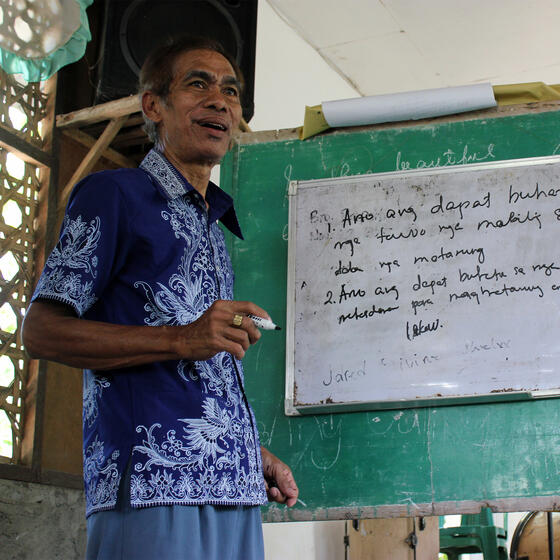Can Religious Teachings Help Lift People Out of Poverty?
About a quarter of the population of the Philippines lives in poverty. A study there, co-authored by Yale SOM’s James Choi, suggests that learning Protestant Christian values and theology can boost poor families’ income. But long-term devoutness might be needed to sustain the benefits.

Photo: David Batcheck, Innovations for Poverty Action
Researchers have long wondered whether being religious leads to better economic outcomes. For instance, Max Weber famously hypothesized that a Protestant work ethic that emphasizes industriousness and thrift caused people to earn and save more money, leading to the emergence of modern capitalism.
But showing that religion actually causes these benefits is challenging. The problem is that “religion, obviously, is not something that is randomly assigned,” says James Choi, a professor of finance at Yale SOM. Even if religious people appear to earn higher salaries, perhaps some unmeasured factor—such as their upbringing—led them to be both hard-working and religious.
In a recent study, Choi’s team addressed that problem by randomly assigning poor households in the Philippines to be invited to attend classes that taught Protestant Christian values and theology. The researchers found that, compared to families that didn’t get invited to such a program, the invitees’ income increased in the short term. “It may actually have some economic benefit,” says Choi, who collaborated with Gharad Bryan at the London School of Economics and Dean Karlan at Northwestern University on the study.
But a few years after the program ended, people’s devoutness faded, and so did their income gains, suggesting that evangelical organizations may need to follow up with participants to have a lasting impact.
Choi’s team worked with International Care Ministries (ICM), a Filipino organization that teaches a three-part program called Transform. One part focuses on Protestant Christian values and theology; for example, pastors teach that setbacks are part of God’s plan and encourage participants to do “good works” such as saving money, working hard, and avoiding gambling and drinking. The second component teaches healthy and hygienic behaviors. And the third provides livelihood and small business skills, such as compost production.
Pastors identified about 9,600 poor families in 320 communities in the Philippines. The researchers then randomly split the communities into groups. Some households were invited to the full three-part program, others to only the religious values and theology teaching, and others to only the health and livelihood training; a control group received no training. (The total amount of religious outreach done by ICM was not altered by the study.) On average, invited households attended nine of the 16 weekly class sessions. The team surveyed about 6,500 households six months after the program ended and about 5,800 households 30 months later, measuring factors such as religious beliefs and economic outcomes.
Religious teachings may give participants more tools to overcome hardship. Perhaps, says Prof. James Choi, they think, “I can pull through this because God is watching over me, and he has a plan for me.”
At the six-month mark, people who were invited to the religion classes did seem to become more devout than those who weren’t invited. And the religion program was linked to a 9% increase in income, which is “quite striking,” Choi says.
The researchers suspect that the boost came from having more “grit,” or the ability to work hard and persist. For instance, people invited to the values classes were more likely to agree that “I finish whatever I begin” and “Setbacks don’t discourage me.” Perhaps religious beliefs motivated participants to seek new or better jobs, despite their family’s hardships. Their attitude might be that “I can pull through this because God is watching over me, and he has a plan for me,” Choi says.
Surprisingly, even though participants were making more money, the religion program seemed to lower their perceptions of their own relative economic status in the community. The reason might be that because they were now working in jobs with higher hourly earnings, they encountered better-off members of society, which made their own standing seem worse in comparison.
Thirty months after the program ended, people invited to the religion program no longer reported stronger religious feelings than people who didn’t undergo that part of the program—and the increase in income disappeared too. Choi’s interpretation is that religious belief did cause the initial economic boost, but the subsequent drop in devoutness also weakened their determination to overcome hurdles and seek a better life. If people continue their religious practice, though, they might see longer-term economic benefits, he speculates.
As for the group that received only health and livelihood training, the team saw little effect on their income at six months. But by 30 months, the differences were substantial. Compared to the control group, these participants spent an average of 4.3 more hours per week on work and earned about US$17 more per month (a 10% increase). Perhaps they hadn’t put their new skills into practice right away, but over the next few years, “they were able to move the needle on their economic well-being,” Choi says.
Choi wonders what these results might mean for the United States, where religiosity has dropped over the last few decades. If devoutness has benefits, then “it does suggest that maybe there is something to worry about, even at a purely economic level,” he says.
Is religious training the only way to teach values like hard work and perseverance? It turns out that providing substitutes isn’t easy. Choi’s team started a secular pilot program in the Philippines to teach similar values, but the researchers abandoned the effort because it was too difficult to find effective instructors. In contrast, many pastors are passionate and skilled at communication. Religion is “a proven delivery mechanism for some of these values,” he says.
That doesn’t mean that people should push religious teachings just to increase people’s income. “The reason to deliver religious programming is because you believe that the message is true and that it has spiritual benefits,” Choi says.